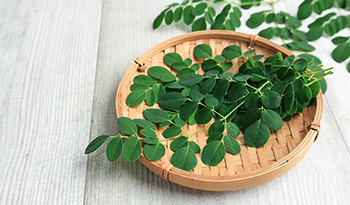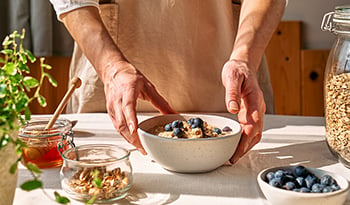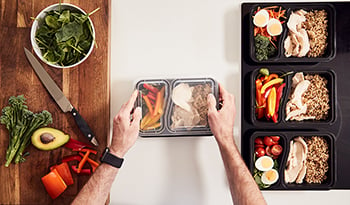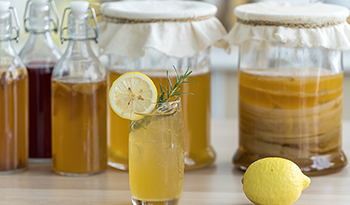Best Natural Sugar Alternative: Allulose, Monk Fruit, Stevia, + More
Key Takeaways
- Best All-Around: Allulose is a top choice because it tastes like sugar, has minimal calories, doesn't impact blood sugar, and typically causes no digestive issues.
- Zero-Calorie Favorites: Stevia and monk fruit are 200-300x sweeter than sugar with zero calories and no blood sugar impact, though some may notice a slight aftertaste.
- Use in Moderation: Less-processed sweeteners like maple syrup and coconut sugar contain minerals but are still forms of sugar and should be used sparingly.
- Sugar Alcohols (Erythritol): These are generally safe in small doses (under 10g/day) but can cause digestive issues. Recent studies suggest caution with high, frequent intake of erythritol.
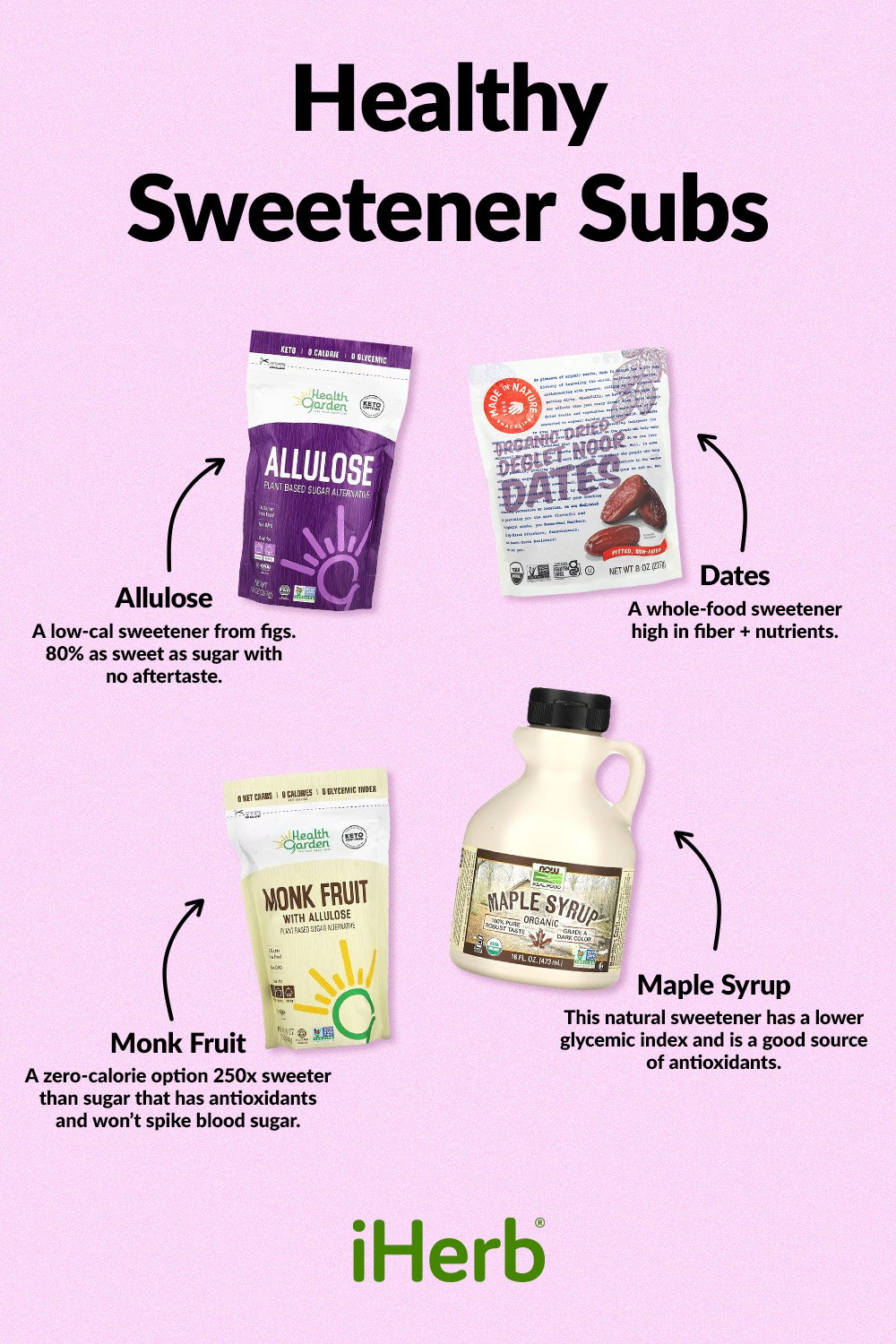
Why You Should Consider A Sugar Substitute
High sugar intake is linked to obesity, type 2 diabetes, heart disease, and other health issues. Artificial sweeteners like aspartame, sucralose, and saccharin don’t reliably reduce calorie consumption or body weight. Some studies suggest they may increase appetite, leading to higher calorie intake.
Artificial sweeteners have also been linked to insulin resistance and worsened blood sugar control, which may explain why high consumption of diet drinks is tied to a higher risk of heart disease.
Additionally, data from the National Institutes of Health (NIH) show adults who drink diet beverages are 30% more likely to develop depression than those who don’t.
The takeaway? Avoid artificial sweeteners and choose natural, zero- or low-calorie alternatives instead. Our bodies need glucose for energy, but we don’t need added sugars. While they can add a sweet touch to life, there are plenty of healthier ways to sweeten your food.
What Is Sugar?
There are two types of sugar: natural and added. Natural sugars are found in fruits and vegetables, while added sugars are added by manufacturers to enhance flavor. Foods with these sugars are classified as simple or complex carbohydrates, based on how quickly the body digests them.
- Simple carbohydrates, like refined sugar, candy, and white bread, digest quickly and provide immediate energy.
- Complex carbohydrates, like whole grains, fruits, and some vegetables, digest more slowly and offer long-lasting energy.
The glycemic index (GI) measures how quickly a food raises blood sugar. Simple carbs usually have a higher GI, while complex carbs have a lower GI. Understanding the effects of sugar is important for your health. The average American consumes about 17 teaspoons of sugar daily, not surprisingly, with over 56 different names for sugar! Added sweeteners fall into four categories: naturally occurring, refined, artificial, and sugar alcohols.
Where Does Added Sugar Come From?
Sugar comes from various sources. Some foods, like fruits and vegetables, naturally contain it, while manufacturers add sugar to enhance flavor. The most common added sugars come from sugarcane or sugar beets, which are grown like other crops. However, some manufacturers process sugarcane using bone char, an activated carbon filter made from cow bones, to whiten it. While bone char doesn’t end up in the sugar, some vegans prefer to avoid it. Sugar beets typically don’t undergo this process unless cross-contaminated with sugarcane. To ensure sugar is vegan, check the label.
Types Of Sugar
All sugars are made of saccharide molecules. Sugars with one molecule, like glucose, are monosaccharides. Those with two molecules, like table sugar, are disaccharides. The most common types of sugars include:
- Glucose: A simple carbohydrate and the body's preferred fuel, found in fruits, vegetables, and whole grains. It’s also used as added sugar.
- Sucrose: A disaccharide of fructose and glucose, commonly known as table sugar. It also occurs naturally in some fruits and vegetables.
- Fructose: A monosaccharide found naturally in fruit and commonly added to processed foods as high fructose corn syrup.
The key difference between natural and added sugar is that foods with natural sugar also provide nutrients, fiber, and minerals along with energy. The American Heart Association recommends limiting added sugar to less than 6% of daily calories—about 25 grams for women and 38 grams for men. If you’re cutting back on added sugar, alternative sweeteners can be a good option.
Best Healthy Sugar Substitutes
With so many sugar alternatives on the market today it can be confusing to know which to choose. The healthiest alternative sweeteners are lower on the glycemic index, have minimal impact on blood sugar levels, and don’t cause digestive issues like gas or bloating. Low- or zero-calorie natural sweeteners are the best solution to lower the intake of sugar and synthetic sweeteners. Here are some great healthy sweeteners you can try.
Stevia
The most popular is stevia, a zero-calorie natural sweetener extracted from the Stevia plant. Stevia is a plant-based sweetener that is 200 to 300 times sweeter than sugar but doesn't impact blood sugar levels. It can be used in baking or in any way you would use regular sugar. Stevia is a high-intensity sweetener with a strong safety profile, though some may notice a slight bitter aftertaste, which has improved over time. Often mixed with maltodextrin or other sweeteners, it enhances sweetness while offering health benefits like reducing oxidative stress and aiding long-term blood sugar control.
Allulose
Allulose is a type of sugar found in wheat and fruits like figs. It’s slowly absorbed by the body and doesn’t impact blood sugar levels. Allulose is a low-calorie sugar, about 80% as sweet as sugar but with only 1/10th the calories of sucrose or fructose. Unlike sugar alcohols, it’s absorbed in the gastrointestinal tract, so it doesn’t cause gas or bloating. Studies show allulose is well-tolerated with no side effects and doesn’t have the aftertaste often found in stevia or monk fruit. It tastes just like sugar. Allulose may be the “Holy Grail” of sweeteners, promoting blood sugar control and supporting weight management by enhancing GLP-1 release. Human studies have shown that meals with allulose significantly reduce blood sugar and insulin responses, especially in people with pre-diabetes or diabetes. Allulose is ideal for those with blood sugar issues and is also great for weight loss. It’s often combined with monk fruit to create a 1:1 sugar replacement in recipes, offering the benefits of both sweeteners.
Monk fruit
Monk fruit or luo han guo extract is another zero-calorie, high-intensity natural sweetener used in Traditional Chinese Medicine for almost 1,000 years. Monk fruit sweetener is 100 to 250 times sweeter than table sugar but doesn't have the same impact on blood sugar levels. It comes in granules, syrup, or liquid drops. Monk fruit is often paired with erythritol, a sugar alcohol, to boost sweetness. Like stevia, monk fruit extracts with at least 80% mogrosides are used as a natural, zero-calorie sweetener. Mogrosides also provide health benefits, including antioxidant activity and activating AMPK, an enzyme that improves metabolism.
Sugar alcohols
Sugar alcohols, or polyols, are low-calorie sweeteners like erythritol, xylitol, sorbitol, mannitol, and maltitol. They are safe in moderate amounts but can cause gastrointestinal issues, such as discomfort or diarrhea, at higher doses (over 10 grams daily), especially in children. Erythritol, popular for being better tolerated than other sugar alcohols, is now widely used in foods and drinks, often at high levels similar to sugar. However, studies suggest consuming more than 30 grams of erythritol in one sitting may increase the risk of blood clots and artery hardening linked to heart disease. To stay safe, limit erythritol intake to under 10 grams per day, well below risky levels.
Maple syrup
Made from the sap of maple trees, maple syrup is an excellent alternative to honey or sugar. It has a lower glycemic index and is also high in antioxidants compared to other sweeteners.
Coconut sugar
Made from the sap of the coconut tree, coconut sugar is a less-processed form of sugar. Coconut sugar has a lower glycemic index, meaning your blood sugar won’t spike as much after eating it. It can be used at a 1:1 ratio with white sugar granules.
Dates
Dates are high in fiber and other nutrients like potassium and magnesium. Whole dates, date syrup, and date paste are all great alternatives for sweetening smoothies or baked goods.
Yacón syrup
Low on the glycemic index and a good prebiotic, yacón syrup helps feed the good bacteria in your gut while it sweetens your food.
Recommendations For Sugar Intake
The Dietary Guidelines for Americans 2020-2025 suggest that people over two years limit their added sugar intake to less than 10% of their total daily calorie intake.5 It also sets an overall health goal in the United States to reduce added sugar consumption.
Though you should limit added sugars, you generally don’t need to limit naturally occurring sugar from fruits and vegetables. Fruits and vegetables are loaded with vitamins, minerals, and nutrients, along with naturally occurring sugar, providing longer-lasting energy to fuel your day. You’re unlikely to consume too much sugar from whole plant-based food sources.
Sweetener alternatives can significantly reduce sugar intake while continuing to eat sweet foods you enjoy. Restricting all added sugar can result in sugar cravings and isn’t always a sustainable option for those of us who love sweets. Allowing yourself to have these foods occasionally is a healthy way to balance your diet.
Ways To Reduce Added Sugar Intake
Too much added sugar can increase your risk of chronic diseases like obesity, type 2 diabetes, and heart disease.6 The best way to limit your sugar intake is to eat less packaged and processed foods and increase the number of whole plant foods in each meal. Here are some tips for reducing the amount of added sugar you eat:
- Remove any sugar cubes or table sugar from eyesight and store them in your cabinet.
- Sprinkle a sugar alternative on top of the grapefruit to cut the bitterness and increase your amount of fruit (unless you have been directed to avoid grapefruit due to medication interactions).
- Reduce your serving size of sugar-containing foods.
- When cooking or baking, cut the amount of sugar by half and use spices, herbs, and fresh or dried fruit to add more flavor.
Conclusion
Diets loaded with added sugar can lead to chronic diseases like heart disease and diabetes. Healthy sweetener alternatives can help you limit your added sugar intake and avoid some of its adverse impacts on your health. Choose one that works best for you and your lifestyle.
Remember, while you aim to limit the amount of sugar you eat, restricting yourself too much can lead to feelings of guilt and shame when you do eat sugar. Using the sugar alternatives above may help you reach your health goals more easily while still enjoying some sweetness in your diet.
References:
- O'Connor D, Pang M, Castelnuovo G, et al. A rational review on the effects of sweeteners and sweetness enhancers on appetite, food reward and metabolic/adiposity outcomes in adults. Food Funct. 2021 Jan 21;12(2):442-465.
- Kossiva L, Kakleas K, Christodouli F, Soldatou A, et al. Chronic Use of Artificial Sweeteners: Pros and Cons. Nutrients. 2024 Sep 19;16(18):3162.
- Queiroz I, Defante MLR, Tavares A, et al. High consumption of artificially sweetened beverages and associated risk of cardiovascular events: A systematic review and meta-analysis. Curr Probl Cardiol. 2025 Jan;50(1):102837.
- Guo X, Park Y, Freedman ND, Sinha R, Hollenbeck AR, Blair A, Chen H. Sweetened beverages, coffee, and tea and depression risk among older US adults. PLoS One. 2014 Apr 17;9(4):e94715.
- Patel S, Navale A. The Natural Sweetener Stevia: An Updated Review on its Phytochemistry, Health Benefits, and Anti-diabetic Study. Curr Diabetes Rev. 2024;20(2):e010523216398.
- Muñoz-Labrador A, Hernandez-Hernandez O, Moreno FJ. A review of the state of sweeteners science: the natural versus artificial non-caloric sweeteners debate. Stevia rebaudiana and Siraitia grosvenorii into the spotlight. Crit Rev Biotechnol. 2024 Sep;44(6):1080-1102.
- Mazi TA, Stanhope KL. Elevated Erythritol: A Marker of Metabolic Dysregulation or Contributor to the Pathogenesis of Cardiometabolic Disease? Nutrients. 2023 Sep 16;15(18):4011.
- Li J, Dai Q, Zhu Y, et al. Low-calorie bulk sweeteners: Recent advances in physical benefits, applications, and bioproduction. Crit Rev Food Sci Nutr. 2024;64(19):6581-6595.
- Risso D, DunnGalvin G, Saxena S, Doolan A, Spence L, Karnik K. Gastrointestinal tolerance of D-allulose in children: an acute, randomised, double-blind, placebo-controlled, cross-over study. Food Funct. 2024 Jan 2;15(1):411-418.
- Bloomer RJ, Pence J, Hellenbrand J, Davis A, Davis S, Stockton M, Martin KR. Randomized Trial to Assess the Safety and Tolerability of Daily Intake of an Allulose Amino Acid-Based Hydration Beverage in Men and Women. Nutrients. 2024 Jun 5;16(11):1766.
- Yuma T, Tokuda M, Nishimoto N, et al. Allulose for the attenuation of postprandial blood glucose levels in healthy humans: A systematic review and meta-analysis. PLoS One. 2023 Apr 6;18(4):e0281150.
- Preechasuk L, Luksameejaroenchai C, Tangjittipokin W, Kunavisarut T. Short-term effects of allulose consumption on glucose homeostasis, metabolic parameters, incretin levels, and inflammatory markers in patients with type 2 diabetes: a double-blind, randomized, controlled crossover clinical trial. Eur J Nutr. 2023 Oct;62(7):2939-2948.
DISCLAIMER:This Wellness Hub does not intend to provide diagnosis...
















































































 Table of Contents
Table of Contents











